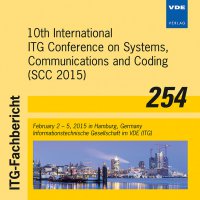Analysis of Analog Modulo Block Codes
Konferenz: SCC 2015 - 10th International ITG Conference on Systems, Communications and Coding
02.02.2015 - 05.02.2015 in Hamburg, Germany
Tagungsband: SCC 2015
Seiten: 6Sprache: EnglischTyp: PDF
Persönliche VDE-Mitglieder erhalten auf diesen Artikel 10% Rabatt
Autoren:
Schmitz, Tim; Ruengeler, Matthias; Vary, Peter (Institute of Communication Systems and Data Processing, RWTH Aachen University, Germany)
Inhalt:
Digital transmission of analog speech, audio, or video requires source coding which introduces unavoidable quantization errors. The bit stream produced by the source encoder needs to be protected against transmission errors by channel coding. The split of a given gross bit rate between source and channel coding is a compromise taking into account the design target of the worst case channel. Thus, even in clear channel conditions the quality of the decoded source signal is limited because of the irreversible quantization errors. Analog transmission systems with discrete-time and quasi-continuous-amplitude encoding and decoding do not show this saturation effect. Instead, their performance improves for increasing channel qualities. Examples are Linear Analog Block Codes, which show a poor overall performance, and (nonlinear) Archimedes spirals, which are just suited for the case of transmitting one source symbol with two channel uses. Here, Analog Modulo Block Codes are proposed, which employ the matrix multiplication used in Linear Analog Block Codes while adding a modulo operation as nonlinearity. These codes combine the advantages of outperforming all purely digital codes in very good channel conditions (because of the absent quantization error) and requiring less energy per symbol than Linear Analog Block Codes (because of the modulo operation). Two different types of decoders are presented, and the results are evaluated and discussed.


